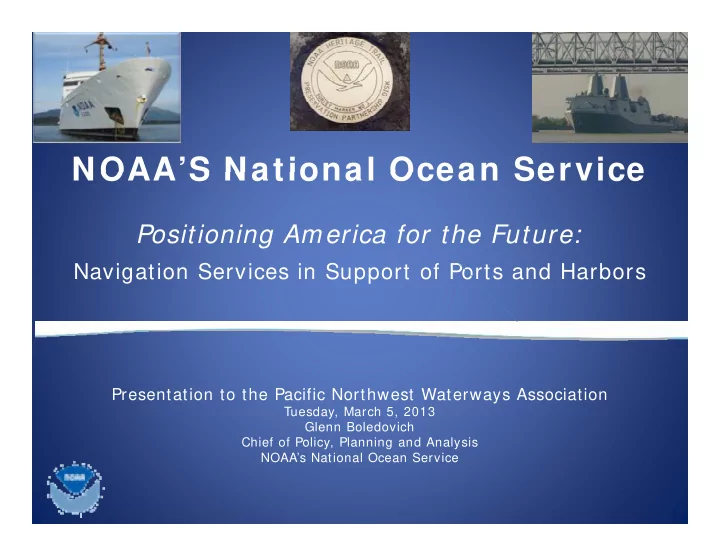

NOAA’S National Ocean Service NOAA S National Ocean Service Positioning America for the Future: Positioning America for the Future: Navigation Services in Support of Ports and Harbors Presentation to the Pacific Northwest Waterways Association Tuesday, March 5, 2013 Glenn Boledovich Chief of Policy, Planning and Analysis NOAA’ N ti NOAA’s National Ocean Service l O S i
NOAA’s National Ocean Service Positioning America for the future • Safe, strong and efficient commerce • Prepared and resilient coastal communities P d d ili l i i • Vital and productive environments
Safe, strong and efficient commerce • Geodetic Framework: Global positioning and national geographic reference system ti l hi f t • Hydrography and nautical charts • Predicted, real-time and forecast tides, currents, and other ocean observations • Rapid maritime response Rapid maritime response
2 0 1 2 CORS Netw ork • > 1,865 Stations • > 200 federal > 200 federal, state, local and academic partners • Growth - 10 new stations per month • Usage • Usage – 4 to 5 4 to 5 million datasets downloaded per month
Operational PORTS (20) Operational PORTS (20) Operational PORTS (20) FY2012 PORTS (3) FY2012 PORTS (3) FY2012 PORTS (3) Cherry Point Cherry Point Cherry Point Cherry Point Cherry Point Cherry Point New London New London New London Humboldt Bay Humboldt Bay Humboldt Bay Gulfport Gulfport Gulfport Gulfport Jacksonville Jacksonville Jacksonville Lake Charles Lake Charles Lake Charles Lake Charles Lake Charles Lake Charles New Orleans New Orleans New Orleans New Orleans New Orleans New Orleans New Orleans New Orleans New Orleans New Orleans New Orleans New Orleans Northern Gulf Northern Gulf Northern Gulf of Mexico OFS of Mexico OFS of Mexico OFS
Inches Matter
Positioning America for the Future : Committed to Relevant, Reliable Services • Regional Navigation Managers – Crescent.Moegling@noaa.gov • Navigation Response Teams • State Geodetic Advisors • Hydrographic Services Review Panel H d hi S i R i P l – Dr. David Jay of Portland State University • Interagency Committee on the Marine g y Transportation System
Positioning America for the Future : Response and Other NOS Products and Services • Environmental Response Management Application • Multi-purpose Marine Cadastre • • Sea Level Rise (SLR) Viewer & Inundation Tools Sea Level Rise (SLR) Viewer & Inundation Tools – www.stormsurge.noaa.gov – www.tidesandcurrents.noaa.gov/ quicklook.shtml – www.noaawatch.gov • • Computer-Aided Management of Emergency Operations (CAMEO) Computer-Aided Management of Emergency Operations (CAMEO) – Mapping Applications for Response, Planning, and Local Operational Tasks (MARPLOT) – Areal Locations of Hazardous Atmospheres (ALOHA) • • Integrated Ocean Observing System Integrated Ocean Observing System • Integrated Ocean and Coastal Mapping • Coastal Management
NOAA responds to Sandy
Storm Quicklook gives essential info QuickLook integrates water level info with the National Hurricane Center projected storm path.
Port Tomorrow: Envisioning a Resilient Future for Port Communities for Port Communities
Contribution Examples Nautical Charts PORTS NWLON Contribution Examples Resilience Planning Tool ERMA MMC Coastal Zone Management Contribution Examples Weather Ready Nation Products IOOS IOOS SLR Viewer
Planning for Resilient Marine Transportation To be resilient, port communities should have the infrastructure and resources , p needed to sustain safe, secure and economically viable marine transportation system operations. Marine Capacity Intermodal Capacity Safety and Security
Planning for Resilient Port Communities To be resilient port communities should effectively balance economic environmental To be resilient, port communities should effectively balance economic, environmental and societal benefits and costs associated with marine transportation operations. Community Livability Community Livability Natural Resources Economic Development
Planning for Resilience to Coastal Hazards To be resilient port communities should be able to keep marine transportation To be resilient, port communities should be able to keep marine transportation moving, businesses open, and people working, despite the effects of hazard events. H Hazard Risks d Ri k Community Vulnerabilities Disaster Responses i
Budget Uncertainties
Recommend
More recommend